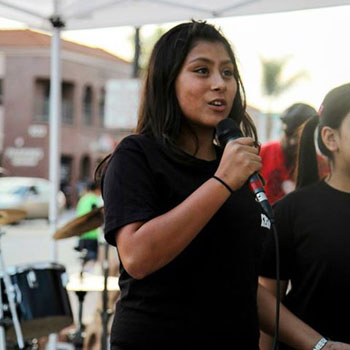
Unlock Your Voice: Transform Your Singing!
By Paul Kwo
Whether you love or hate reality singing competitions, the one thing we all learned from these shows are our often delusions of our own voices. Though many hopefuls often over-estimate their own abilities, thinking all they need is a moment to shine, the opposite is also true. Many people are fearful of their own voice and thus in terms obstructing their own development.
We hear amazing singers and we either have a delusion thinking that's who we already are, or that we can never be because of our innate talent. Those who start out before taking any lessons with a solid voice because they have been singing on their own for a long time. They were not born with a better voice. They only grew up continuously singing. But even the greatest raw talent is still raw, and a professionally trained ear can hear so. The truth of the matter is no great singers become so without the help of vocal teachers and coaches. We all need another ear to take us to the next level. I say if legends like Michael Jackson, Celine Dion, Stevie Wonders, Mariah Carey and many others.
For those who have been singing for years before beginning training with a teacher, the answer to whether their voice is any good may seem obvious. But for those who have not had the confidence in singing on their own prior to training, it may sometimes seem hopeless. However keep in mind that training takes years, upwards of 10+ or more years. Most student enter instrumental lessons such as piano or guitar with the understanding that it will take them 10+ years to be well training. Most students began with zero understanding in and ability to play the piano. They start from scratch. But singers assume that they should be able to sing a well complete song in a matter of days. Such expectations then breaks down confidence as students with less vocal history when they progress slowly in lesson, thinking their voice is just not good enough. But the truth is simply they haven't been singing enough on their own.
CLASSICAL VERSUS CONTEMPORARY POP
I often tell students that in contemporary Pop music (and I include all genres such as Rock, R&B, Country, Pop, Hip Hop etc. under the Pop umbrella) there is no such thing as a voice that's good enough. It is entirely based on a speaking voice and how unique the voice is. Success is only a matter of being in the right place at the right time and have near nothing to do with skill level and how beautiful one's voice is. Certainly there are great singers out there with great voices, but there are also plenty others who do not have a classically beautiful voice yet still have great success.
With classical voice, it's a slightly different issue. The pure tones are often the most important factor in judgement of the voice. Thus there is a specific sound that is desired and it's much more difficult for students who's voice palette may not fit into this norm. But as with all things, the brilliant exception with great training can often still win the hearts of the audience.
The history of Classical voice training is long and extensive, and it has a clear cut road towards reaching for the correct sound that will create success. But with Contemporary Pop music singing, it's a less straight forward and requires a teacher to bring out the unique voice of the student. There are many schools of thoughts developed over the last couple of decades on how to train contemporary Pop singers. Some are good and some are not. It's up to the student to figure out if the training being provided is good for them or not. While choosing, the only thing that matter is whether the student likes the sound that he or she is making, and does the production of the sound strains the vocal cords. If it's a desirable sound and does not strain the cords, then nothing matters beyond that.
So over the course of the past years, I have developed my own teaching method that I first applied on myself and eventually on my student. I believe anyone can sing as singing is only an extension of speaking. No one speaks in a robotic monotone. We all have tones in our speech. Those who are “tone deaf” simply have not mastered a control of their voice. If you can speak, you can sing, and you can sing well with proper training.
So my teaching philosophy in Contemporary Pop singing is simple: “highlight the uniqueness of a student's voice through an authentic connection with the lyrics of the song with the most effortless technique.” Do this and your voice is good enough.

